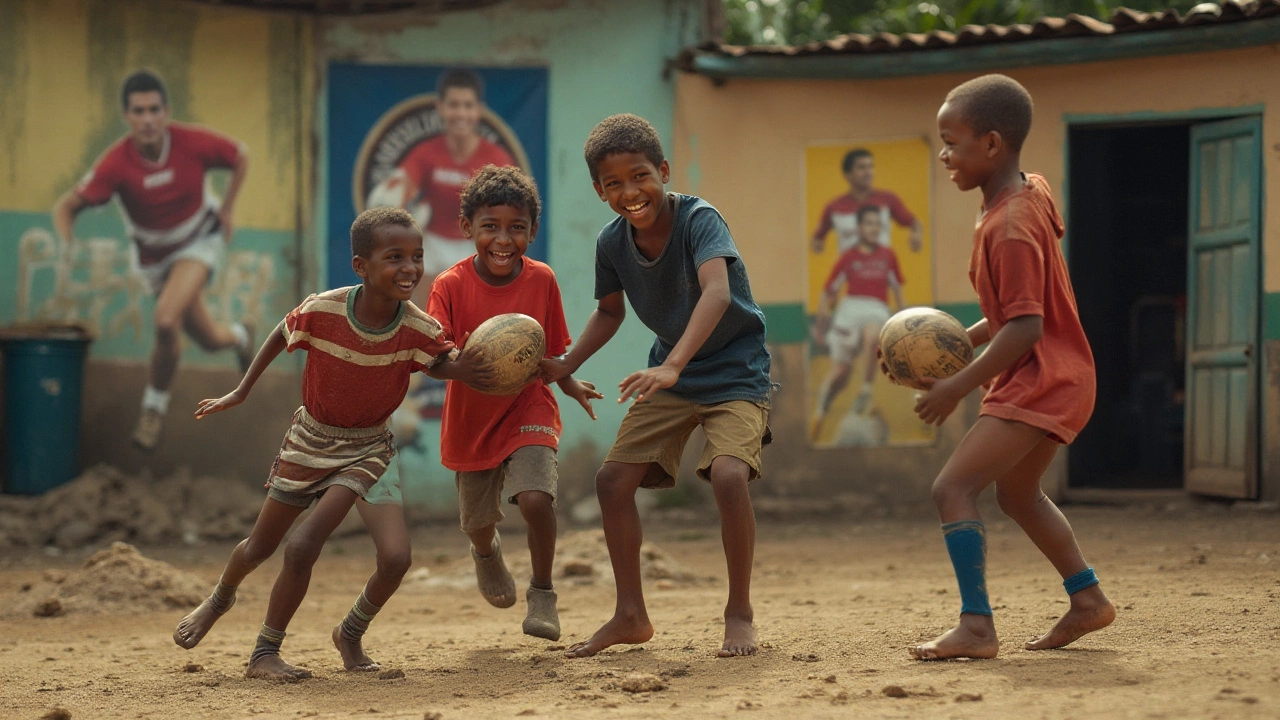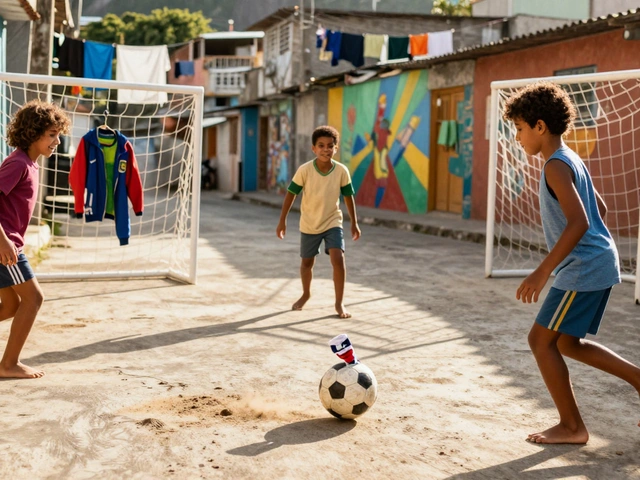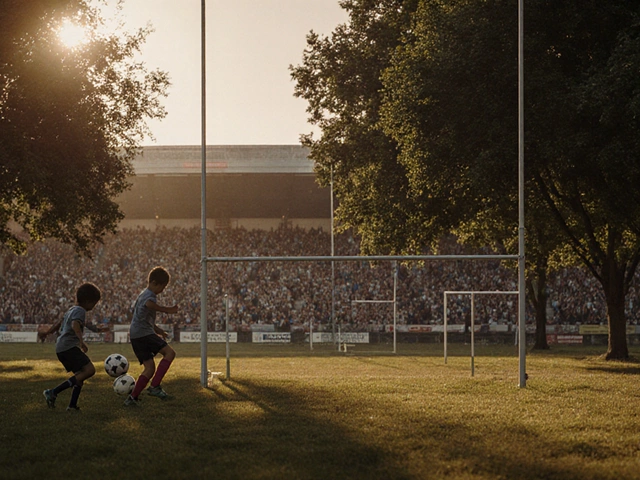Rugby in Brazil? It may seem unexpected at first glance, considering the country's undying love for football. Yet, in recent years, rugby's story in Brazil has grown more compelling, with intriguing developments and unique challenges along the way.
This article delves into this captivating narrative, from the sport's initial introduction to the South American giant, to a closer look at the current state of the game within the country. We explore the rising number of local clubs and the invaluable role they play in nurturing young talents. Additionally, we'll look into how international fixtures are enhancing rugby's profile in Brazil, sparking curiosity and enticing new fans across the nation.
As with any burgeoning movement, several hurdles remain for rugby in Brazil. Despite these challenges, the potential for growth is palpable, creating exciting prospects for the future. Join us as we uncover the essence of Brazilian rugby and its journey towards expansion and recognition on the global stage.
- Rugby's Introduction to Brazil
- Current Rugby Landscape
- Grassroots and Local Initiatives
- Influence of International Fixtures
- Challenges Facing Brazilian Rugby
- Future Opportunities for Growth
Rugby's Introduction to Brazil
Rugby found its way to Brazil during the late 19th century, largely due to the influence of British expatriates who were living and working in the country. These expatriates, often attached to the burgeoning coffee and railway industries, sought to bring a piece of their homeland pastime with them. Though rugby in Brazil started off as a recreational activity among these communities, it slowly began to capture the interest of locals who were enamored by the sport's unique excitement and physicality. It was around this period that clubs began forming in São Paulo and Rio de Janeiro, laying the first foundations of a future for Brazilian rugby.
The first recorded rugby match on Brazilian soil transpired in 1891 between British expatriates in São Paulo, and gradually, a handful of Brazilian enthusiasts joined in occasional matches. Despite this promising start, the sport remained largely overshadowed by football, which swept the nation with its captivating charm in the early 20th century. Yet the spirit of rugby never truly wavered, as it lingered on, maintained by a small but dedicated group of players and advocates who refused to let the game die in the face of overwhelming football fervor. During the subsequent decades, only a few fixtures took place, typically involving touring sides or expat teams, but the embers of rugby smoldered quietly, to one day reignite.
Intriguingly, it wasn't until the late 1970s that rugby began to gain minor traction again, thanks to the establishment of the Brazilian Rugby Confederation (CBRu). This organization played an instrumental role in formalizing the sport and organizing domestic competitions. In a statement not often circulated, Lee Smith, a noted sports historian, remarked,
"Rugby in Brazil, with its Anglo origins, is an intriguing study of persistence, quietly existing and thriving despite long odds."This sentiment underscored the resilience of the rugby community, which pushed forward with modest league formations and nurtured a growing interest in the game.
The subsequent growth of the sport in Brazil has been slow and methodical, reflecting the gradual building of infrastructure both at the grassroots and professional levels. The involvement of certain private companies in funding and promoting rugby took place during the early 2000s. Additionally, international tournaments such as the Rugby Sevens in the Olympic Games offered opportunities to promote rugby within Brazil, heralding a fresh wave of interest and participation. Today, rugby continues to evolve, fueled by dedicated local efforts and increased visibility through international rugby fixtures, setting a new trajectory for the sport in Brazil. This growth is embodied by a nation whose future in rugby seems boundless, brimming with untapped potential and vibrant enthusiasm.
Current Rugby Landscape
As we delve into the current state of rugby in Brazil, it's essential to recognize both the dynamic changes and inherent challenges shaping the sport's trajectory. Rugby in Brazil is buzzing with newfound energy, marking a sharp departure from its years as a little-known pastime. Various leagues and clubs have burgeoned across cities, each contributing to a growing network of talent and enthusiasm. The Brazilian Rugby Confederation (CBRu) has been pivotal in this transformation, providing frameworks and events that have sparked interest and participation among fans and aspiring players alike.
The visibility of this sport has increased significantly with efforts directed at the grassroots level, evidenced by the flourishing of youth programs in schools and communities. These programs provide platforms for young enthusiasts to learn the nuances of rugby early on, nurturing a passion that could sustain the sport's growth long-term.
Notably, the women's rugby scene has gained vibrant momentum, fostering a sense of inclusivity and diversity. Teams like the Brazilian women's rugby sevens have been making waves on international levels, adding a dose of inspiration that could propel more young girls to pick up a rugby ball. A milestone for the community was their participation in the Olympic Games, spotlighting Brazilian talent on the world stage.
"Rugby in Brazil has transcended its initial stages of development. There's a palpable shift in perception and participation," enthused Agustín Danza, CEO of the CBRu, emphasizing the substantive progress made over the years.
The domestic competitions, like the Super 13 league, echo the burgeoning interest in Brazilian rugby growth. They've become a vital element of the local sports culture, where skill and camaraderie meet in thrilling matches. The league has been instrumental in fostering talent and offering competitive avenues for players aiming to pursue rugby professionally.
The integration into international fixtures has likewise boosted rugby’s stature in Brazil. Strategic matches against top-tier teams have not only improved the competitive edge of Brazilian players but have also sparked curiosity among sports fans who religiously follow football. Whether it's their flair for sevens rugby or fifteen-player formats, Brazilian teams are sharpening their skills and gaining valuable exposure to the rigors of international play.
Table highlighting key events:
| Year | Event | Significance |
|---|---|---|
| 2016 | Olympic Games | Brazilian women’s rugby sevens participated, gaining global attention. |
| 2023 | Super 13 Expansion | Boosted local competitive landscape, encouraging broader participation. |
The journey is undoubtedly complex, with certain hurdles remaining in aspects such as infrastructure and funding. Yet, the on-field battles, increasing spectator numbers, and emerging corporate partnerships hint at a promising horizon for rugby in Brazil. Whether it's the thrill of the tackle or the strategic beauty of a line-out, rugby in Brazil is certainly breaking boundaries and capturing the imagination of many.

Grassroots and Local Initiatives
As rugby seeks to carve a place in the heart of Brazilian sports culture, grassroots efforts and local initiatives are proving to be the lifeblood of this endeavor. These initiatives are sprouting across urban centers and rural towns alike, offering young Brazilians a chance to experience this thrilling game. In cities like São Paulo and Rio de Janeiro, community clubs and schools have taken an active role in introducing rugby to their sports programs. This grassroots outreach is essential for nurturing the next generation of players and fans, thus laying a critical foundation for the sport's future in Brazil.
The Confederação Brasileira de Rugby (CBRu) plays a pivotal role in championing rugby at the grassroots level. Through targeted programs and partnerships with educational bodies, CBRu is not only promoting the sport but also educating coaches and referees, ensuring the quality and sustainability of the game. One such program, Rugby de Base, targets children and adolescents, fostering an early love for the sport while instilling values of teamwork and respect. According to CBRu, the number of youth participants has risen steadily each year, a testament to the success of these grassroots campaigns.
"The growth of rugby in Brazil starts with the young," said former national player and coach, João Nogueira. "By engaging with kids at a grassroots level, we are planting seeds for a bright future where rugby becomes part of our sporting identity."
Local clubs are also instrumental in bolstering the grassroots movement. They offer platforms for players of all ages to compete and develop their skills in a nurturing yet competitive environment. Clubs like São José Rugby Clube have not only produced players who represent Brazil in international competitions but have also contributed significantly to their communities by running social projects. The positive impact of rugby extends beyond the field, influencing lives through education, social integration, and personal development.
In addition to these efforts, partnerships with international entities have provided valuable resources and exposure for Brazilian rugby. Collaborations with rugby powerhouses like New Zealand and England facilitate training exchanges and development camps, amplifying the technical prowess of local coaches and players. These partnerships serve as a bridge, connecting Brazilian rugby with the global community and setting the stage for its evolution.
The journey is not without its challenges, yet the enthusiasm and dedication of those involved in grassroots initiatives are undeniable. From planting the initial seeds of interest to cultivating a thriving rugby culture, these local efforts are turning dreams into reality. As rugby continues to grow in Brazil, these initiatives will undoubtedly remain the backbone of its success, shaping a new sporting era for the country.
Influence of International Fixtures
When it comes to sparking interest in rugby, few things are as effective as the buzz created by international fixtures. These events shine a spotlight on rugby, helping to introduce it as a mainstream sport in regions far removed from its traditional heartlands. In Brazil, this impact has been tangible, as international matches have played a pivotal role in stirring up excitement and curiosity among potential new enthusiasts. Live broadcasts of major rugby events, such as the Rugby World Cup and international test matches involving Brazil, have increasingly captured the imagination of the Brazilian audience. With a sport that thrives on tension and spectacle, these fixtures provide a first-row seat to the athleticism and strategy that rugby offers.
Historically, rugby was largely an enigma to the Brazilian crowd, with limited understanding or exposure beyond the nation's borders. As Brazil began to appear on the global rugby radar, participating in international tournaments and hosting visiting teams, the local interest began to swell. Notably, Brazil's participation in the South American Rugby Championship has been pivotal to fostering a competitive spirit. Matches against seasoned teams such as Argentina and Chile provide a benchmark for progress, offering essential experiences for the Brazilian squad and their supporters.
"International games are a window into the sport for new audiences, and they ignite a passion that keeps the game growing," said Horacio Agulla, a former Argentine rugby international.Rugby fixtures have not only offered the Brazilian players opportunities for growth and exposure but have also provided Brazilian spectators with the chance to experience the game's pageantry up close. The ability to witness rugby played at a high level has been transformative, serving to dispel potential myths about the sport being distant or too difficult to understand. This has been no small feat, considering the fierce competition rugby faces from football in Brazil. Over time, these fixtures have cultivated a greater appreciation for the skills involved, and an increase in fan support for Brazil's developing teams.
Statistics reveal that, post-major international matches, there is often a notable spike in rugby club memberships and participation levels in local schools. This ripple effect underscores the importance of international fixtures in contributing to the sport's grassroots efforts. As more fixtures take place on Brazilian soil, both in the domestic league and through hosting international competitions, the potential for rugby to secure its place in Brazil's cultural and sporting identity is strengthened. The path is not without challenges, but steady growth has shown that there is a burgeoning appetite for rugby in the nation.

Challenges Facing Brazilian Rugby
Despite the color and vibrancy often associated with sports in Brazil, rugby faces an uphill battle to become a mainstay. The challenges are multi-faceted, beginning with the dominance of football which overshadows almost all other sports in the country. While football has an ingrained cultural significance, rugby is still seen as an outsider to many. This cultural barrier requires a strategic approach to alter perceptions, tapping into the potential market of enthusiasts who seek something distinctive.
One significant obstacle is the lack of infrastructure devoted to rugby in Brazil. Training facilities, pitches, and youth development programs are not as prevalent as they are in countries where rugby is a well-established sport. Limited resources mean aspiring players often struggle to find the necessary platforms to nurture and showcase their skills. Funding remains a consistent issue, complicating efforts to promote and sustain the sport at both amateur and professional levels. This shortage in infrastructure is acutely observed in less urbanized areas, where access to facilities is even scarcer.
Another challenge is the scarcity of high-level competition within the country. The Brazilian rugby calendar is relatively sparse, with few chances for domestic teams to compete at an internationally recognized level regularly. This lack of exposure hampers the growth of local talent, as the opportunity to measure skills against more seasoned players is limited. Without regular fixtures, it's difficult for players to remain motivated or for the sport to capture the continued interest of the public. Inspiration often comes from seeing national heroes succeed on the international stage, yet without frequent competitions, developing these icons is challenging.
Building Engagement and Interest
Generating widespread interest and engagement in Brazilian rugby involves more than showcasing the sport itself; it needs educational initiatives to teach the game’s rules and values. Brazilian rugby growth hinges on understanding how rugby can be a tool for social cohesion and skill development. Programs designed to integrate rugby into school curriculums could play a pivotal role, creating a new generation of fans and players from a young age. The involvement of schools offers a structured way to spread knowledge and build grassroots support.Alongside education, professional and media exposure play vital roles. Television rights and coverage have the power to bring rugby fixtures into homes across Brazil, demystifying the sport for many. The digital age presents an opportunity here, with social media campaigns engaging fans and creating communities of enthusiasts who can advocate for rugby's benefits and excitement. Yet, securing media deals is itself a challenge, battling for screen time against the cultural giant of Brazilian football.
"Rugby in Brazil is not just about the game; it's about fostering community spirit and building bridges between diverse groups," states renowned rugby commentator Sergio Vasquez. His words underline the sport's potential beyond mere entertainment.Recruiting top-tier coaching talent and establishing exchange programs with rugby-strong nations might help elevate the competitive standards. By learning from those with extensive experience in renowned rugby territories, Brazilian coaches and players can incorporate tried-and-tested training techniques and philosophies.Looking ahead, overcoming these challenges necessitates a unified effort from sports organizations, governmental bodies, and private sponsors eager to invest in an emerging market. Rugby fixtures within the local scene as well as international matches are crucial to maintaining momentum, offering fans something tangible to rally behind as the sport seeks its place among Brazil's rich tapestry of athletic pursuits.
Future Opportunities for Growth
The potential for rugby in Brazil is vast, and tapping into this potential requires strategic efforts on multiple fronts. One of the key factors in driving this growth is the development of infrastructure. While Brazil is known for its extensive football infrastructure, a similar focus on rugby facilities could bolster the game's grassroots reach. Regions like São Paulo and Rio de Janeiro, already sports-centric, could benefit from dedicated rugby fields and training centers. This would not only make the sport more accessible to enthusiasts but also cultivate a culture where rugby is seen as a viable alternative to traditional sports.
Another crucial area is training and development programs aimed at youth. Initiatives that introduce rugby to children in schools can lay a firm foundation for the sport's future. Collaborating with educational institutions to include rugby in their athletics programs can cement its presence in younger generations. Such partnerships could provide the dual benefits of fostering teamwork and providing a physical education alternative. The narrative of rugby instilling discipline and camaraderie is particularly appealing for parents and educators alike.
Boosting the visibility of rugby fixtures through media coverage is another avenue for growth. In today's digital age, streaming services and social media platforms offer new opportunities for engaging a wider audience. Rugby matches can be showcased not only on television but also across online platforms, bringing the excitement of the game to every home in Brazil. Highlighting both local matches and international tournaments on Brazilian networks can spark interest and draw in fans from diverse backgrounds. “You can't win a game if you don't play one,” said a sports director on bringing new audiences to rugby.
A strategic partnership with corporate sponsors can catalyze Brazilian rugby. By attracting investment from local and international companies, leagues can secure funding for tournaments and player development. This could lead to sponsorship deals for teams and players, elevating the financial appeal of pursuing rugby professionally. Businesses could find value in aligning with a sport that epitomizes teamwork and perseverance, attributes that resonate well with brand identities. Hosting international rugby events in Brazil, such as friendly matches or even championship series, could place Brazil on the global rugby map.
Hosting international fixtures in Brazil is a potential game-changer. These events have the promise of transforming the sporting landscape by attracting tourists, international teams, and media attention. They can boost the local economy and offer fans the thrill of world-class rugby on their home turf. Hosting rights could encourage infrastructure upgrades and development projects, indirectly supporting community growth and cohesion. Strategic investments in these events can leave a legacy that transcends the sport itself.
As Brazil looks to the future, technology could play an integral role in rugby's evolution. Innovations such as virtual reality training and data analytics can enhance athletic performance and injury prevention. Embracing these technologies can lure tech-savvy youth to the sport, blending modernity with tradition. As rugby melds with digital advancements, Brazil could become a pioneering nation in redefining how sports integrate with technology, setting trends for others to follow.








